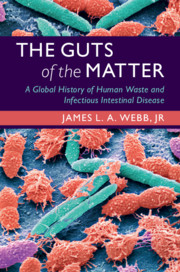
-
Select format
-
- Publisher:
- Cambridge University Press
- Publication date:
- November 2019
- December 2019
- ISBN:
- 9781108642323
- 9781108493437
- 9781108737067
- Dimensions:
- (228 x 152 mm)
- Weight & Pages:
- 0.44kg, 520 Pages
- Dimensions:
- (228 x 152 mm)
- Weight & Pages:
- 0.33kg, 222 Pages
You may already have access via personal or institutional login
Book description
The Guts of the Matter is a study of our oldest ecological problem: the transmission of infectious intestinal disease from human waste. Spanning the early hominin era to the present, this book explores the evolution of human waste disposal practices, the use of faeces and urine as fertilizer, and the changing patterns of transmission of intestinal pathogens and parasites. Chapters trace the spread of viral, bacterial, and helminthic infections through the early processes of globalization and track the uneven successes of the sanitation revolution in recent centuries. The book also provides an overview of the cultural practices that influence the transmission of infectious intestinal disease and the impacts of biomedical advances such as oral rehydration therapy and vaccination. Webb's impressive breadth and meticulous research is invaluable for students of public health, environmental history, global history, and medicine.
Reviews
'James Webb’s The Guts of the Matter delves deep into how and where people have relieved themselves, how this has been related to one group of parasitic diseases and how important this has been - and still is - to developments around the world. It changes readers' outlook on toilets and life.'
Iris Borowy - Shanghai University
'This global history illuminates large bio-social patterns key to the development of all human societies. The vicissitudes of human intestinal diseases - that persistently caused high mortality and sickness - are linked to human waste management and mismanagement, diverse hygienic practices, safe and unsafe water systems, and access to medical treatment (such as hookworm’s drugs, poliovirus vaccines and oral rehydration therapy for cholera). Developments in industrialized and colonial and postcolonial societies are masterfully compared. A sound contribution beyond the field of history.'
Marcos Cueto - Fundação Oswaldo Cruz, Rio de Janeiro, Brazil
‘The combination of chronological breadth and descriptive detail will make this book useful for a wide audience of scholars and professionals.’
Randall M. Packard Source: Bulletin of the History of Medicine
Contents
Metrics
Altmetric attention score
Full text views
Full text views help Loading metrics...
Loading metrics...
* Views captured on Cambridge Core between #date#. This data will be updated every 24 hours.
Usage data cannot currently be displayed.
Accessibility standard: Unknown
Why this information is here
This section outlines the accessibility features of this content - including support for screen readers, full keyboard navigation and high-contrast display options. This may not be relevant for you.
Accessibility Information
Accessibility compliance for the PDF of this book is currently unknown and may be updated in the future.


